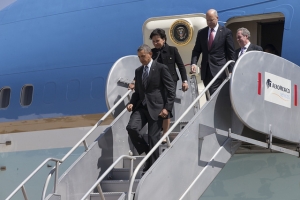Support migrant centric journalism today and donate

Companies in Charlotte, the second largest city and a commercial hub in the state of North Carolina, wants more foreign workers on H-1B visas to fill jobs in the information technology sector. The H-1B visa allows US companies to recruit foreign workers on a temporary basis to fill vacancies requiring highly skilled labor.
Employers in Charlotte say that the H-1B federal visa program enables them to recruit for job roles that receive too few local applicants with the necessary skills and qualifications. Meanwhile, critics say that the H-1B program is abused by some companies as a means of replacing US workers with cheap, foreign labor.
According to a report in the Charlotte Observer, critics suggest that US workers sometimestrain their foreign-born replacements prior to being laid off.
Sanwar Ali, Editor of workpermit.com News had the following comments to make:
The H-1B visa scheme is already highly regulated. You have to pay the "prevailing wage" for the job in the area where the H-1B visa worker will work. Therefore it is difficult to bring in workers from overseas as "cheap labour" on the H-1B visa scheme. Certain publications and people like Donald Trump tend to exaggerate "problems" created by immigrants say on the H-1B visa scheme. While it is inevitable that some abuses occur, in general H-1B visa workers are highly paid and are helping to fill skills shortages so helping the US economy and creating jobs.
Demand high for H-1B visas in Charlotte
Demand for US H-1B visa workers is high nationwide. In April, the H-1B visa allocation went to a lottery as demand exceeded supply within seven days. 85,000 H-1B visas are made available each year. This year the USCIS received over 236,000H-1B visa applications for the 2017 fiscal year (FY17). In the previous financial year, the USCIS is received 233,000 petitions.
In Charlotte, demand soared. According to the Charlotte Observer report 'hundreds of employers filed initial applications in 2015 for more than 16,500 H-1B workers located in the Charlotte metro area. Most of the applications were for technology jobs, while the 16,500 H-1B workers represent a figure that's bigger than the entire workforce of some of Charlotte's largest employers.'
Those in favour of the H-1B visa program, which includes many local employers, highlight a lack of skilled technology talent, which has left thousands of computing jobs open across the state. Officials in Charlotte stated that: "A lack of computer science majors graduating exacerbates the problem."
Bill Chu, a professor at UNC Charlotte's College of Computing and Informatics, said: "In some instances, companies that are bringing in H-1B people at the same time are having staff reductions in the same area – generally speaking, the IT area. There are lots of H-1B people in Charlotte."
India main source of H-1B visa workers
It's no secret that India is one of the biggest users of US H-1B visas. Experts attribute this to the fact that technology is a popular field of study among young, English-speaking Indians who are willing to relocate to the US for work. Federal government data reveals that 70 percent of H-1B visas issued in 2014 were granted to people of Indian origin.
Across the Charlotte metro area, nine out of 10 employers initially filing an application for visa workers in 2015 were outsourcing firms, according to a review of official federal data. The Charlotte Observer states that the Charlotte-based Bank of America was the only exception.
The bank lodged applications for around 380 workers, which ranked it ninth for the number of visas applied for. Across the entire state of Northern Carolina, 33,400 were applied for by employers in 2015.
In recent years because of the H-1B visa quota most of these applications will not be approved. For Charlotte that's bad news, given that federal data shows a 39 percent increase in the number of applications filed by city companies in 2015, compared with 2014. The number of applications lodged nationwide increased by 25 percent.
For US-born employees in Charlotte, the city's continued dependence on H-1B visa workers has raised concerns about their job security. A technology employee at the Bank of America said: "It is a real concern." The employee expressed his concerns anonymously.
Charlotte dependent on H-1B visa workers
According to the Charlotte Observer, a number of applications being filed for by the Bank of America are for positions previously held by American workers who were either laid off or deployed in other job roles.
The anonymous employee said: "I'm working more and more with H-1B visa developers than American developers within our company. We've seen them pretty much replace a lot of the developer/programmer-type roles. If you go into any development team in the bank, I don't know of any American developers that I've worked with over the last couple of years. They're all Indian."
Some of the positions being filled by H-1B workers require only basic computer skills, the employee claimed. The jobs that we're replacing here aren't rocket science. It's database developers, skills you can learn through a four-year program ... at any major American university," the Bank of America employee added.
The Bank of America is understood to have declined to comment.
Bruce Morrison, a former US Republican and a principal author of the 1990 law that led to the creation of the H-1B visa, said: "The original goal was to help companies fill a skills gap. I'm frustrated at how companies, particularly outsourcing firms, are using the program.Such companies hire large amounts of H-1B visa workers to temporarily fill jobs in the US before eventually sending those workers – and the jobs – overseas where wages are lower."
An estimate submitted by an IT industry group to a Senate committee claimed that employers in Charlotte stand to save an average of $17,678 a year, per visa worker they hire.





















